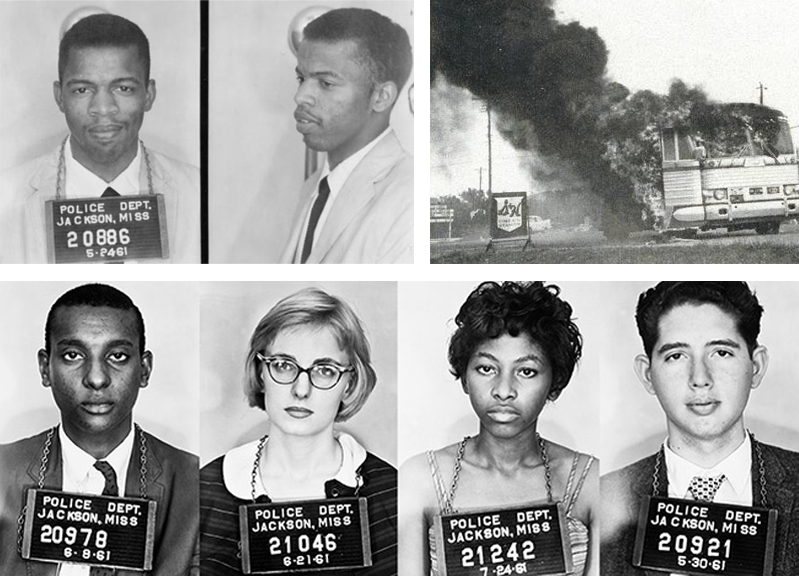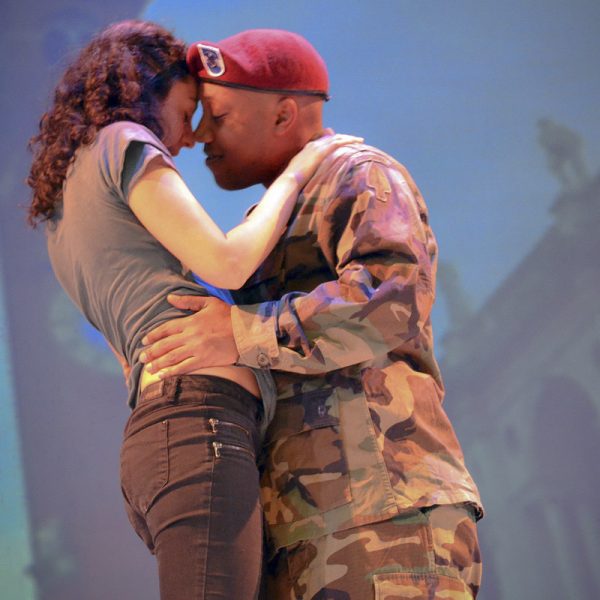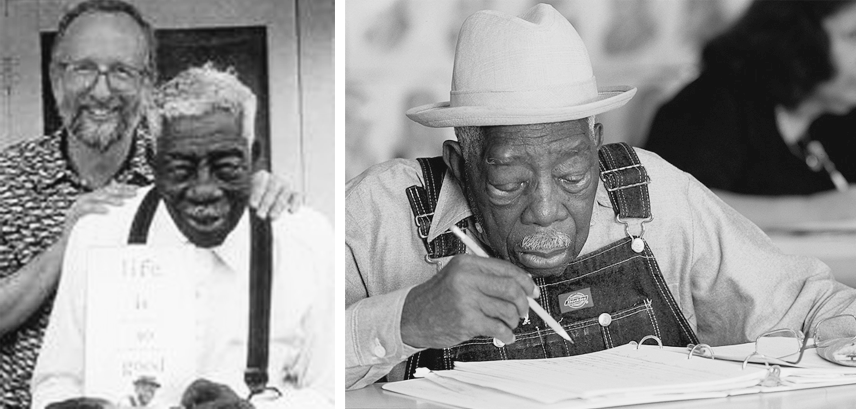



Mike Wiley Productions’ work commemorates the 50th anniversary of the Freedom Riders. In 1961, the original 13 riders boarded a bus in Washington, DC bound for New Orleans via Mississippi and Alabama. They barely made it out of Alabama alive. Over the course of the next three months, approximately 300 other riders took up the mantle and followed the path of those first brave few. Mobs brutally assaulted many. Others were arrested and, instead of posting bail, chose to serve sentences in one of the most brutal prisons in the South, Parchman Farm, proving the Freedom Riders and the movement to desegregate interstate travel would not be deterred.
Presented in the style of the variety shows of yesteryear, this moving production explores three of the tensest months of 1961. The Parchman Hour brings to the stage powerful oral histories and conversations from the Freedom Rides’ most iconic protagonists and antagonists.
“Did you know that at Parchman, to pass the time and to keep our spirits up, we ‘invented’ a radio program? I don’t recall that we named it, but ‘The Parchman Hour’ would have been a good name. Each cell had to contribute a short “act” (singing a song, telling a joke, reading from the Bible — the only book we were allowed) and in between acts we had ‘commercials’ for the products we lived with every day, like the prison soap, the black-and-white striped skirts, the awful food, etc. We did this every evening, as I recall; it gave us something to do during the day, thinking up our cell’s act for the evening.” — Mimi Real, Freedom Rider, 1961
Originally produced by the Center for Documentary Studies at Duke University and the Department of Dramatic Art at the University of North Carolina at Chapel Hill, The Parchman Hour is a celebration of bravery and a call to action through remembrance, leaving the audience asking, “Who stood up for me? Moreover, for whom can I stand up for today? Who needs my words, my song, my voice?”
Production is 90 minutes in length and appropriate for a mixed audience. There is also a 50-minute student version for grades 6 and higher.
To inquire about licensing & production rights, contact:
Stephen Barefoot | goingbarefoot llc | 1410 Shepherd Street Durham, NC 27707
Office: 919.614.1235| stephen@goingbarefoot.com http://www.goingbarefoot.com
THE PARCHMAN HOUR
4 stars out of 5
Mike Wiley Productions
Kenan Theatre, UNC Department of Dramatic Art
Through Monday, Dec. 6
Over the past decade, the region has come to admire Mike Wiley’s series of intensely researched—and brilliantly crafted—original one-person shows that have illuminated significant (but frequently neglected) events in America’s long and problematic racial history. Wiley’s unerring ear for dialogue, acute editorial sense of scene, and significant gifts as an actor and a mimic have made solo works like DAR HE: THE LYNCHING OF EMMETT TILL (partially captured in the film EMPTY SPACE, which took honors at last year’s Carrboro Film Festival) actually feel like an evening spent among an intense community of people, united at times and divided at others by a common dilemma.
But after his 2008 adaptation of Tim Tyson’s BLOOD DONE SIGN MY NAME (with a “cast” of over 20 characters, all which he performed) pointed to the possible limits of what anyone could accomplish with a one-man show, THE PARCHMAN HOUR, Wiley’s new work about the Freedom Riders of the civil rights movement in 1961, marks his first script written for a company of actors, and his first time directing—or, at least, directing other performers on stage.
Thankfully, the news from its world premiere at UNC’s Kenan Theater is good.
Wiley effectively marshals the talents of the classes he has taught this semester as a guest artist through theCenter for Documentary Studies at Duke and UNC’s Department of Dramatic Art. Students who have meticulously researched their characters place us in the haunting presence of activists including Congress on Racial Equality (CORE) president James Farmer (Lariah Ijames), Student Nonviolent Coordinating Committee (SNCC) member (and, later, U.S. Representative) John Lewis (Doug Bynum) and Stokely Carmichael (an entrancing Kashif Powell). To their number we add Michael Goolsby’s chilling performance of two inmates at Mississippi’s notorious maximum security prison, Parchman Farm, RaTasha Tillery-Smith’s equally chill portrayal of a prison guard—and her eerie, heartfelt rendition of the spiritual, “Travelling Shoes.”
For those who need reminding—and those who never knew—the Freedom Riders were an interracial group of activists who sought to test a 1960 Supreme Court decision, along with rules established some five years earlier, that ostensibly banned racial discrimination on public transportation in the U.S. “In any sane, even half-civilized society,” Carmichael wrote, the act of black and white citizens sitting together on a bus “would have been completely innocuous, hardly worth a second thought or meriting any comment at all.” But the groups that attempted to ride from Washington to New Orleans in May, 1961 had their bus firebombed—while they were still on it—outside Anniston, Ala. They were subsequently attacked by mobs, first in Birmingham and then in Montgomery, before their arrest in Jackson, Miss. and subsequent incarceration at Parchman.
Music director Mary Williams has produced a haunting soundtrack here, working with these vocalists and a local student blues quartet. Indeed, one of the main achievements in this work involves the depiction of the self-styled, self-produced “variety shows” the inmates staged each evening, from their cells, during their incarceration—the shows which give THE PARCHMAN HOUR its name. Williams and Wiley effectively demonstrate just how unifying and restorative the music of the struggle was, and how the community invoked by the dialogue and jokes of those hours strengthened these activists in their time of trial.
True, THE PARCHMAN HOUR occasionally suffers from a form of dramatic whiplash when scenes that effectively depict beatings and other atrocities slam up against suddenly celebratory musical sequences without adequate transition. But the taut, tense editing and layering of the witnesses’ testimony counteracts the sense of condensation such a story could easily have. On the other hand, Aya Hope Shabu’s choreography veers into melodrama at points, as student cast members segue too abruptly between varying depictions of physical shock and distress in attempts to reference news photographs from the period.
Still, Mike Wiley’s new work is a strong—actually, make that necessary—reminder, not only of some of the starkest realities of the segregated South, but of the astounding resilience of those who chose to stand against it. The production’s scrupulous accounting of the very real divisions among the leaders of the civil rights movement, their own crises of conscience and cowardice, and the “measured” political responses of government representatives (including then-U.S. Attorney General Bobby Kennedy), adds appreciable depth, dimension and veracity to the times depicted. Strongly recommended.

Voices from the Homefront is a new play about how military spouses in the post 9/11 era face and overcome the challenges of repeated deployments. It is a honest, raw, funny and inspiring look at the profound strength and resilience of our nation’s military families.
Downrange began as a project to engage the military community of Fayetteville by putting them at the center of the art making experience. It was developed from extensive interviews with military spouses from Fort Bragg and written by North Carolina playwright Mike Wiley.
To inquire about licensing & production rights, contact:
Stephen Barefoot | goingbarefoot llc | 1410 Shepherd Street Durham, NC 27707
Office: 919.614.1235 | stephen@goingbarefoot.com http://www.goingbarefoot.com

Life Is So Good brings audiences the story of 103-year-old George Dawson, a slave’s grandson who learned to read at age 98. This moving work offers reflections on Dawson’s life, valuable lessons in living and a fresh, firsthand view of America during the twentieth century. His unlikely friend Richard Glaubman, an elementary school teacher, captures Dawson’s irresistible voice and view of the world, offering insights into humanity, history, hardships and happiness. From segregation and civil rights, to the wars, presidents, and defining moments in history, George Dawson’s description and assessment of the last century works to inspire audiences with the message that — through it all — has sustained him: “Life is so good. I do believe it’s getting better.”
Production is 100 minutes in length and appropriate for grades 5 and higher. There is also a 50 minute student version.
To inquire about licensing & production rights, contact:
Stephen Barefoot | goingbarefoot llc | 1410 Shepherd Street Durham, NC 27707
Office: 919.614.1235 | stephen@goingbarefoot.com http://www.goingbarefoot.com